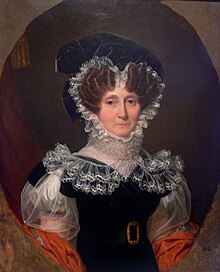Princess Amalie Zephyrine of Salm-Kyrburg
| Amalie Zephyrine | |
|---|---|
| Princess of Hohenzollern-Sigmaringen | |

Amalie Zephyrine of Salm-Kyrburg
|
|
| Born |
6 March 1760 Paris |
| Died | 17 October 1841 (aged 81) Sigmaringen, Principality of Hohenzollern-Sigmaringen |
| Spouse | Anton Aloys, Prince of Hohenzollern-Sigmaringen |
| Issue | Karl, Prince of Hohenzollern-Sigmaringen |
| House |
House of Salm (birth) Hohenzollern-Sigmaringen (marriage) |
| Father | Philip Joseph, Prince of Salm-Kyrburg |
| Mother | Maria Thérèse of Hornes |
Amalie Zephyrine of Salm-Kyrburg (Paris, 6 March 1760 – Sigmaringen, 17 October 1841) was a daughter of Prince Philip Joseph of Salm-Kyrburg (the first prince of Salm-Kyrburg) and Princess Maria Thérèse de Hornes, eldest daughter and heiress of Maximilian, Prince of Hornes. She married into the House of Hohenzollern-Sigmaringen, and is considered the "savior" of Hohenzollerns.
Amalie was born and raised in Paris, although the family seat of the Salm-Kyrburgs was Kirn, which today is part of the German state of Rhineland-Palatinate. She was the eighth child in the family and was baptised at the Church of Saint-Sulpice.
In 1782, on her parents' request, she married erbprinz Anton Aloys, Prince of Hohenzollern-Sigmaringen. Her new home city of Sigmaringen was not to her taste, however, and three weeks after the birth of her son, Karl, in 1785, she returned to her native Paris. There her brother, Prince Frederik III, was busy with the building of the "Hôtel de Salm," which was to serve as the Paris residence of the Salm-Kyrburg family and a gathering place for members of the high nobility. (The hotel eventually was seized by the Revolutionary government and is today the Palais de la Légion d'Honneur.)
During the French Revolution, her brother Frederick and her lover, Alexandre de Beauharnais, were executed by guillotine in 1794 and buried in mass graves. Amalie survived the Revolution and in 1797, she used her connections to find out the location of the graves, which had been kept hidden from the French public. She secretly purchased the land on rue de Picpus and had it opened up to the rest of the garden, which is today called the Picpus Cemetery.
...
Wikipedia
